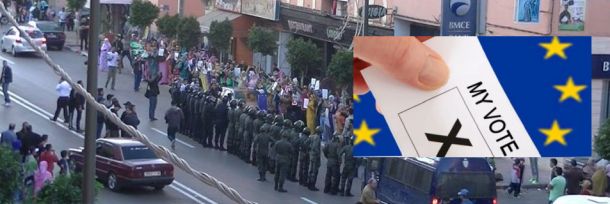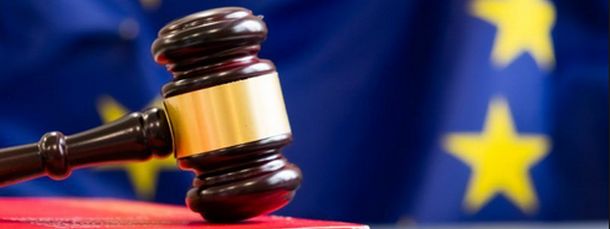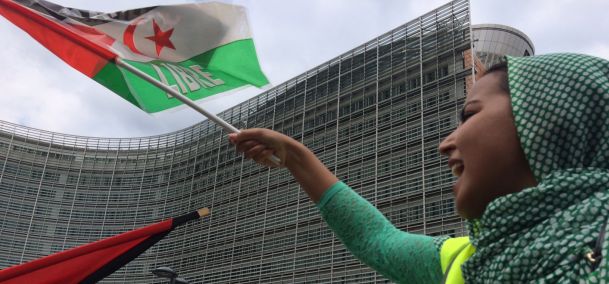
"As a European I feel embarrassed", stated the former UN legal chief regarding the EU's fisheries activities in the waters of occupied Western Sahara, taking place in violation of international law. New trade agreements between Morocco and the EU - which Morocco is applying in Western Sahara - are entering info force in October 2012. WSRW questions the award of the Nobel peace prize to Morocco's important ally.
Photo: Oslo, 2010. Saharawis demonstrate in front of the Spanish embassy. The lobby of the Spanish fisheries industry vis-à-vis the European Commission affects part of the entire union's Western Sahara policy.
"The EU has obviously played a part in building bridges, stability and peace internally in Europe. But in the question of Morocco's occupation of Western Sahara, the EU plays a central part in sabotaging the UN peace process", said Erik Hagen, chair of Western Sahara Resource Watch. Today, it was announced that the EU would receive the Nobel Peace Prize.
The subject of natural resources of Western Sahara is currently part of the UN peace talks between the parties to the conflict - Morocco and Polisario.
"Parallel to these talks, the EU is aggressively pursuing new trade deals with Morocco - agreements that the industries make use of in the territory of Western Sahara. This directly contributes to the undermining of the UN's peace efforts and international law. It seems regardless of how much the Saharawis demonstrate peacefully against the EU's violation of international law, the EU will refuse to listen to them. The EU's deep cooperation with its close neighbour Morocco is a provocation to those forces in Western Sahara that struggle for peace and democracy with peaceful means", stated Hagen.
"The EU should take this prize as an inspiration to promote internationally the same values that the union is built upon. A first step should be to critically assess its trade negotiations with oppressive regimes, and not to cause damage through its commercial activities to oppressed and occupied peoples ", he said.
A new trade agreement between the EU and Morocco entered into force in October. The agreement covers trade in agricultural and fisheries products, both which are made in the territory of Western Sahara. Despite repeated calls to clearly exclude Western Sahara from the scope of the agreement, no action was taken to do so.
This means that the king of Morocco can today export his company's agricultural products to the European market. The production takes place on giant plantations on occupied, confiscated land. Read about the trade agreeement here. The EU failed to listen to calls from the Saharawis to prevent this from happening.
Last year, the European Parliament did in fact vote down the fisheries in Western Sahara, something which was highly welcomed by the Saharawis. But shortly after, the Commission, under Spanish pressure, took the initiative to resume talks over a new deal.
Corell said it is "obvious that a[EU-Morocco fisheries] agreement…that does not make a distinction between the waters adjacent to Western Sahara and the waters adjacent to the territory of Morocco would violate international law". Corell added: "As a European I feel embarrassed".
In the question of EU's illegal plunder of Western Sahara's natural resources, the Union is generally divided. Northern Europe argues that the EU cannot cooperate with Morocco in Western Sahara in regard of international law - while Southern Europe mostly argues for EU employment opportunities. In the last vote in the Council of Ministers, it was only by small minority that the Spanish interests got through with their agenda.
Now, the EU is in negotiations with Morocco over a new fisheries deal, while the Sahrawi people are excluded from the talks, yet again.
Read more about WSRW's campaign against the EU fisheries on our campaign site www.fishelsewhere.eu.
Morocco is the EU's largest recipient of foreign aid, and a substantial purchaser of EU arms. Under French presidency, Morocco was given a so-called Advanced Status relationship with the EU. Morocco is now in talks to become an even more integral part of the European market, through the co-called DCFTA-talks (Deep and Comprehensive Free Trade Agreement).
While the Council of Ministers and the Commission pursue these deals, the Parliament has generally expressed themselves more critically vis-à-vis Morocco, such as on the human rights situation in the occupied territory.
More than 100 UN resolutions demand that the Saharawi people's right to self-determination be respected. Morocco's claims to the territory have been rejected by the International Court of Justice in The Hague. According to the former UN Legal Counsel, it would be in violation of international law to make use of the natural resources in Western Sahara without the Saharawi people's consent.
EU elections: how have candidates voted on occupied Western Sahara?
Are you casting your vote for the EU elections? Find here a complete overview of MEP candidates who have supported the Moroccan occupation of Western Sahara in previous controversial votes. Choose wisely.
UK High Court confirms EU Court rulings on Western Sahara
The UK Court has concluded that the UK government has acted unlawfully in granting preferential tariff treatment to products from Western Sahara through a deal with Morocco, and in granting fisheries quota's for fishing in Western Sahara under a fish deal with Morocco.
EU Court reaffirms position on Western Sahara
Polisario has a case, but it should be pursued when the time is right, Court implies.
Saharawi groups object to EU's Western Sahara trade plans
No less than 93 Saharawi groups have called on the EU institutions to respect the will of the people of Western Sahara when negotiating trade or fisheries agreements that will affect their occupied land.


